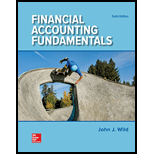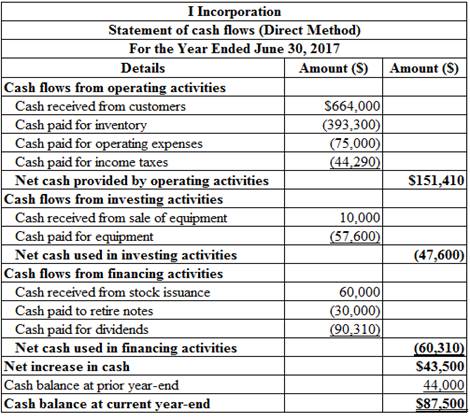
Concept explainers
Prepare the statement of
Explanation of Solution
Statement of cash flows: Statement of cash flows reports all the cash transactions which are responsible for inflow and outflow of cash and result of these transactions is reported as ending balance of cash at the end of reported period. Statement of cash flows includes the changes in cash balance due to operating, investing, and financing activities.
Cash flows from operating activities: Cash flows from operating activity represent the net cash flows from the general operation of the business by comparing the cash receipt and cash payments.
Direct method: The direct method uses the cash basis of accounting for the preparation of the statement of cash flows. It takes into account those revenues and expenses for which cash is either received or paid.
The below table shows the way of calculation of cash flows from operating activities using direct method:
| Cash flows from operating activities (Direct method) |
| Add: Cash receipts. |
| Cash receipt from customer |
| Less: Cash payments: |
| To supplier |
| Interest expense |
| For operating expenses |
| Income tax expenses |
| Net cash provided from or used by operating activities |
Table (1)
Cash flows from investing activities: Cash provided by or used in investing activities is a section of statement of cash flows. It includes the purchase or sale of equipment or land, or marketable securities, which is used for business operations.
| Cash flows from investing activities |
| Add: Proceeds from sale of fixed assets |
| Sale of marketable securities / investments |
| Dividend received |
| Deduct: Purchase of fixed assets/long-lived assets |
| Purchase of marketable securities |
| Net cash provided from or used by investing activities |
Table (2)
Cash flows from financing activities: Cash provided by or used in financing activities is a section of statement of cash flows. It includes raising cash from long-term debt or payment of long-term debt, which is used for business operations.
| Cash flows from financing activities |
| Add: Issuance of common stock |
| Proceeds from borrowings |
| Proceeds from sale of |
| Proceeds from issuance of debt |
| Deduct: Payment of dividend |
| Repayment of debt |
| Interest paid |
| Redemption of debt |
| Purchase of treasury stock |
| Net cash provided from or used by financing activities |
Table (3)
The statement of cash flows for the year ended June 30, 2017:

Table (4)
Working notes:
The amount of cash receipts from customers.
Step 1: Calculate the change in accounts receivable.
Step 2: The Calculate the amount of cash receipts from customers.
Calculate the cash payments to suppliers.
Step 1: Calculate the change in inventory.
Step 2: Calculate the change in accounts payable.
Step 3: Calculate the amount of cash payments to suppliers.
Calculate the amount of cash paid for other operating expenses:
Step 1: Calculate the change in prepaid expenses.
Step 2: Calculate the change in wages payable.
Step 3: Calculate the amount of cash paid for other operating expenses.
Calculate the amount of cash paid for income tax expenses:
Step 1: Calculate the change in income taxes payable.
Step 2: Calculate the amount of cash paid for income taxes.
Calculate the cash receipt from sale of equipment:
| Details | Amount ($) | Amount ($) |
| Cost of equipment sold | 48,600 | |
| Less: Accumulated depreciation | (40,600) | |
| Book value of equipment | 8,000 | |
| Gain on sale of equipment | 2,000 | |
| Cash receipt from sale of equipment | $10,000 |
Table (2)
Calculate the amount of cash paid for new equipment:
Calculate the amount of dividend paid:
Want to see more full solutions like this?
Chapter 12 Solutions
Financial Accounting Fundamentals
- Variable overhead:135000, fixed overhead:175000arrow_forwardFor the current year, Patterson Company incurred $218,000 in actual manufacturing overhead cost. The Manufacturing Overhead account showed that overhead was overapplied in the amount of $16,500 for the year. If the predetermined overhead rate was $11.75 per direct labor hour, how many direct labor hours were worked during the year? Helparrow_forwardThe following information relates to Herbal's two departments for the month of Februaryarrow_forward

 AccountingAccountingISBN:9781337272094Author:WARREN, Carl S., Reeve, James M., Duchac, Jonathan E.Publisher:Cengage Learning,
AccountingAccountingISBN:9781337272094Author:WARREN, Carl S., Reeve, James M., Duchac, Jonathan E.Publisher:Cengage Learning, Accounting Information SystemsAccountingISBN:9781337619202Author:Hall, James A.Publisher:Cengage Learning,
Accounting Information SystemsAccountingISBN:9781337619202Author:Hall, James A.Publisher:Cengage Learning, Horngren's Cost Accounting: A Managerial Emphasis...AccountingISBN:9780134475585Author:Srikant M. Datar, Madhav V. RajanPublisher:PEARSON
Horngren's Cost Accounting: A Managerial Emphasis...AccountingISBN:9780134475585Author:Srikant M. Datar, Madhav V. RajanPublisher:PEARSON Intermediate AccountingAccountingISBN:9781259722660Author:J. David Spiceland, Mark W. Nelson, Wayne M ThomasPublisher:McGraw-Hill Education
Intermediate AccountingAccountingISBN:9781259722660Author:J. David Spiceland, Mark W. Nelson, Wayne M ThomasPublisher:McGraw-Hill Education Financial and Managerial AccountingAccountingISBN:9781259726705Author:John J Wild, Ken W. Shaw, Barbara Chiappetta Fundamental Accounting PrinciplesPublisher:McGraw-Hill Education
Financial and Managerial AccountingAccountingISBN:9781259726705Author:John J Wild, Ken W. Shaw, Barbara Chiappetta Fundamental Accounting PrinciplesPublisher:McGraw-Hill Education





